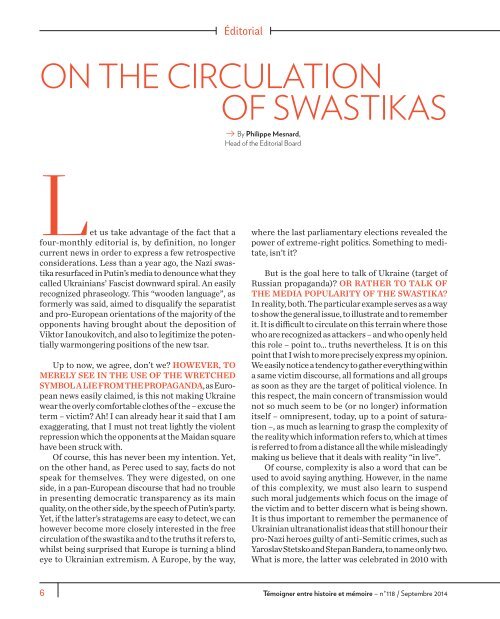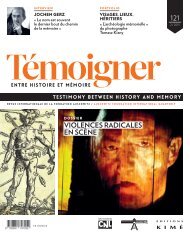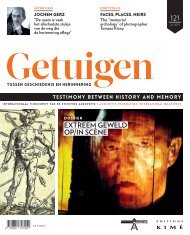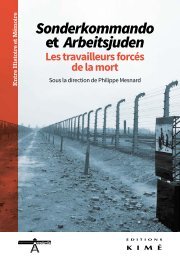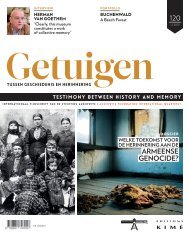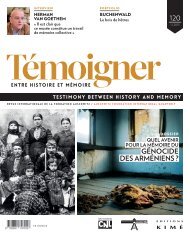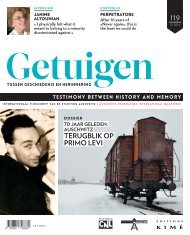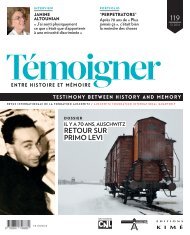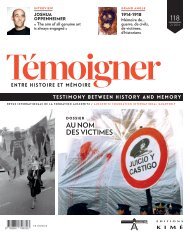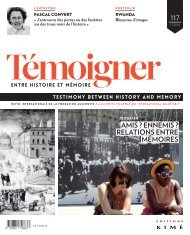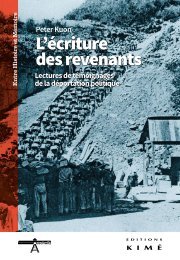Revue : Témoigner entre histoire et mémoire - n° 118 (septembre 2014) : Au nom des victimes. Dictature et terreur d'État en Argentine, Chili et Uruguay
Après les dictatures qui règnent sur l’Argentine, le Chili et l’Uruguay des années 1970 jusqu’en 1990, le processus de résolution démocratique de ces histoires de terreur semble nécessairement en passer par la construction de récits et, ce faisant, de mémoires qui reconfigurent le passé. Au cœur de ces processus propres à chacun des pays, s’impose la figure de la victime que viennent questionner les textes rassemblés par Claudia Feld, Luciana Messina et Nadia Tahir.
Après les dictatures qui règnent sur l’Argentine, le Chili et l’Uruguay des années 1970 jusqu’en 1990, le processus de résolution démocratique de ces histoires de terreur semble nécessairement en passer par la construction de récits et, ce faisant, de mémoires qui reconfigurent le passé. Au cœur de ces processus propres à chacun des pays, s’impose la figure de la victime que viennent questionner les textes rassemblés par Claudia Feld, Luciana Messina et Nadia Tahir.
Create successful ePaper yourself
Turn your PDF publications into a flip-book with our unique Google optimized e-Paper software.
Éditorial<br />
Editorial<br />
ON THE CIRCULATION<br />
OF SWASTIKAS<br />
L<strong>et</strong> us take advantage of the fact that a<br />
four-monthly editorial is, by definition, no longer<br />
curr<strong>en</strong>t news in order to express a few r<strong>et</strong>rospective<br />
considerations. Less than a year ago, the Nazi swastika<br />
resurfaced in Putin’s media to d<strong>en</strong>ounce what they<br />
called Ukrainians’ Fascist downward spiral. An easily<br />
recognized phraseology. This “wood<strong>en</strong> language”, as<br />
formerly was said, aimed to disqualify the separatist<br />
and pro-European ori<strong>en</strong>tations of the majority of the<br />
oppon<strong>en</strong>ts having brought about the deposition of<br />
Viktor Ianoukovitch, and also to legitimize the pot<strong>en</strong>tially<br />
warmongering positions of the new tsar.<br />
Up to now, we agree, don’t we? HOWEVER, TO<br />
MERELY SEE IN THE USE OF THE WRETCHED<br />
SYMBOL A LIE FROM THE PROPAGANDA, as European<br />
news easily claimed, is this not making Ukraine<br />
wear the overly comfortable clothes of the – excuse the<br />
term – victim? Ah! I can already hear it said that I am<br />
exaggerating, that I must not treat lightly the viol<strong>en</strong>t<br />
repression which the oppon<strong>en</strong>ts at the Maidan square<br />
have be<strong>en</strong> struck with.<br />
Of course, this has never be<strong>en</strong> my int<strong>en</strong>tion. Y<strong>et</strong>,<br />
on the other hand, as Perec used to say, facts do not<br />
speak for themselves. They were digested, on one<br />
side, in a pan-European discourse that had no trouble<br />
in pres<strong>en</strong>ting democratic transpar<strong>en</strong>cy as its main<br />
quali ty, on the other side, by the speech of Putin’s party.<br />
Y<strong>et</strong>, if the latter’s stratagems are easy to d<strong>et</strong>ect, we can<br />
however become more closely interested in the free<br />
circulation of the swastika and to the truths it refers to,<br />
whilst being surprised that Europe is turning a blind<br />
eye to Ukrainian extremism. A Europe, by the way,<br />
A By Philippe Mesnard,<br />
Head of the Editorial Board<br />
where the last parliam<strong>en</strong>tary elections revealed the<br />
power of extreme-right politics. Som<strong>et</strong>hing to meditate,<br />
isn’t it?<br />
But is the goal here to talk of Ukraine (targ<strong>et</strong> of<br />
Russian propaganda)? OR RATHER TO TALK OF<br />
THE MEDIA POPULARITY OF THE SWASTIKA?<br />
In reality, both. The particular example serves as a way<br />
to show the g<strong>en</strong>eral issue, to illustrate and to remember<br />
it. It is difficult to circulate on this terrain where those<br />
who are recognized as attackers – and who op<strong>en</strong>ly held<br />
this role – point to… truths nevertheless. It is on this<br />
point that I wish to more precisely express my opinion.<br />
We easily notice a t<strong>en</strong>d<strong>en</strong>cy to gather everything within<br />
a same victim discourse, all formations and all groups<br />
as soon as they are the targ<strong>et</strong> of political viol<strong>en</strong>ce. In<br />
this respect, the main concern of transmission would<br />
not so much seem to be (or no longer) information<br />
itself – omnipres<strong>en</strong>t, today, up to a point of saturation<br />
–, as much as learning to grasp the complexity of<br />
the reality which information refers to, which at times<br />
is referred to from a distance all the while misleadingly<br />
making us believe that it deals with reality “in live”.<br />
Of course, complexity is also a word that can be<br />
used to avoid saying anything. However, in the name<br />
of this complexity, we must also learn to susp<strong>en</strong>d<br />
such moral judgem<strong>en</strong>ts which focus on the image of<br />
the victim and to b<strong>et</strong>ter discern what is being shown.<br />
It is thus important to remember the perman<strong>en</strong>ce of<br />
Ukrainian ultranationalist ideas that still honour their<br />
pro-Nazi heroes guilty of anti-Semitic crimes, such as<br />
Yaroslav St<strong>et</strong>sko and Stepan Bandera, to name only two.<br />
What is more, the latter was celebrated in 2010 with<br />
his statue being raised, non<strong>et</strong>heless! In other words,<br />
it is not because Ukraine has claimed to be against<br />
Vladimir Putin’s authoritative regime, that Ukrainian’s<br />
main political t<strong>en</strong>d<strong>en</strong>cies are all unanimously close<br />
to democracy as it is conceived (imagined) within the<br />
European Community. Furthermore, forbidding the<br />
Russian language at the <strong>en</strong>d of February <strong>2014</strong>, forming<br />
straight away Oleskandr Turchynov’s temporary<br />
power, hardly gave any guarantees of democracy. To<br />
say it somewhat briefly: the <strong>en</strong>emies of our <strong>en</strong>emies<br />
are not necessarily our fri<strong>en</strong>ds.<br />
THE EXPRESSION SEEMS TRITE, IT IS TRUE.<br />
The problem – for it is important to maintain a contradictory<br />
debate –, is that the downward spirals of<br />
Ukrainian extremists are not a reason to disqualify<br />
the <strong>en</strong>tire soci<strong>et</strong>y and not to believe in its pot<strong>en</strong>tial<br />
and its <strong>des</strong>ire to reach a democracy. Ukraine’s sad history<br />
should be remembered. The history of a country<br />
that was for c<strong>en</strong>turies caught b<strong>et</strong>we<strong>en</strong>, brok<strong>en</strong> up and<br />
invaded by their neighbours (Poland, <strong>Au</strong>stria, Germany,<br />
tsarist Russia, Sovi<strong>et</strong> Union). Remember the<br />
two great famines, the repression and the communist<br />
deportations during the 1930s and th<strong>en</strong> after the war.<br />
Serious disputes heavily strained the relations b<strong>et</strong>we<strong>en</strong><br />
Ukraine and the ex-Sovi<strong>et</strong> Union. Civil war carried on<br />
in this Bloodland until the beginning of the 1950s. And<br />
such brutality.<br />
BRUTALITY, EXACTLY. At least, it was not<br />
directed anymore to the Jews, for in these lands, there<br />
wer<strong>en</strong>’t any Jews remaining. It must be said that their<br />
decimation began with the pogroms dating from the<br />
<strong>en</strong>d of the 19th c<strong>en</strong>tury, largely carrying on during the<br />
1914-1918 war, the 1920s and <strong>en</strong>ding under the Nazi<br />
reign. In this s<strong>en</strong>se, Putin’s propaganda points to the<br />
truly s<strong>en</strong>sitive zone of a country which, as well as all<br />
the Baltic countries, never really revisited their <strong>en</strong>thusiastic<br />
and systematic participation in the Shoah. This<br />
precisely leads us back to the swastika.<br />
Save the date<br />
The Fr<strong>en</strong>ch issue of the journal<br />
Testimony b<strong>et</strong>we<strong>en</strong> history<br />
and memory will be pres<strong>en</strong>ted<br />
by Luba Jurg<strong>en</strong>son<br />
in the pres<strong>en</strong>ce of Philippe Mesnard,<br />
at the Palabres me<strong>et</strong>ing on 7 October <strong>2014</strong><br />
at 7pm at the Hungarian Institute<br />
(rue Bonaparte 92, 75006 Paris).<br />
Initiative: CIRCE (C<strong><strong>en</strong>tre</strong> Interdisciplinaire de<br />
Recherches C<strong><strong>en</strong>tre</strong>-Europé<strong>en</strong>nes), Paris-<br />
Sorbonne University and Adice (Association<br />
pour le Développem<strong>en</strong>t <strong>des</strong> Initiatives<br />
Citoy<strong>en</strong>nes <strong>et</strong> Europé<strong>en</strong>nes).<br />
Organisation: <strong>Au</strong>rélie Roug<strong>et</strong>-Garma,<br />
Paris-Sorbonne University and CIRCE,<br />
<strong>Au</strong>relie.Roug<strong>et</strong>-Garma@paris-sorbonne.fr<br />
Coordination: Malgorzata Smorag-Goldberg,<br />
Paris-Sorbonne University and CIRCE,<br />
maougocha@usa.n<strong>et</strong><br />
www.facebook.com/Palabres<br />
Indeed, wh<strong>en</strong> I saw the swastika being waved on<br />
television news, I immediately said to myself that this<br />
cross is everywhere. We see it continually, alone or with<br />
Hitler’s portrait. Also, it is not merely the question of<br />
the place of the Holocaust within our culture that must<br />
be debated, but also of the Nazism within this very culture.<br />
What is most worrisome, is the naturalization<br />
of this symbol. Immediately recognizable, simple, it<br />
already had every necessary quality to become a sort of<br />
badge or a label. Today with pedagogy being one of the<br />
key words relating to memory, it would be interesting<br />
to decipher this paradoxical iconolatry with stud<strong>en</strong>ts.<br />
What do you think of this idea? ❚<br />
To learn more about Ukrainian ultranationalism, its nostalgia and its<br />
support from the state, I would like to refer to the particularly<br />
<strong>en</strong>light<strong>en</strong>ing article by Delphine Bechtel, ‘Les pogroms <strong>en</strong> Galicie, 1941:<br />
<strong>des</strong> pages blanches de l’<strong>histoire</strong> à une <strong>histoire</strong> <strong>en</strong> pointillés?’,<br />
in Luba Jurg<strong>en</strong>son & Alexandre Prstojevic, Des Témoins aux héritiers.<br />
L’écriture de la Shoah <strong>et</strong> la culture europé<strong>en</strong>e, Paris: P<strong>et</strong>ra, 2012, 113-135.<br />
6 <strong>Témoigner</strong> <strong><strong>en</strong>tre</strong> <strong>histoire</strong> <strong>et</strong> <strong>mémoire</strong> – <strong>n°</strong><strong>118</strong> / Septembre <strong>2014</strong> Testimony b<strong>et</strong>we<strong>en</strong> history and memory – <strong>n°</strong><strong>118</strong> / September <strong>2014</strong><br />
7


